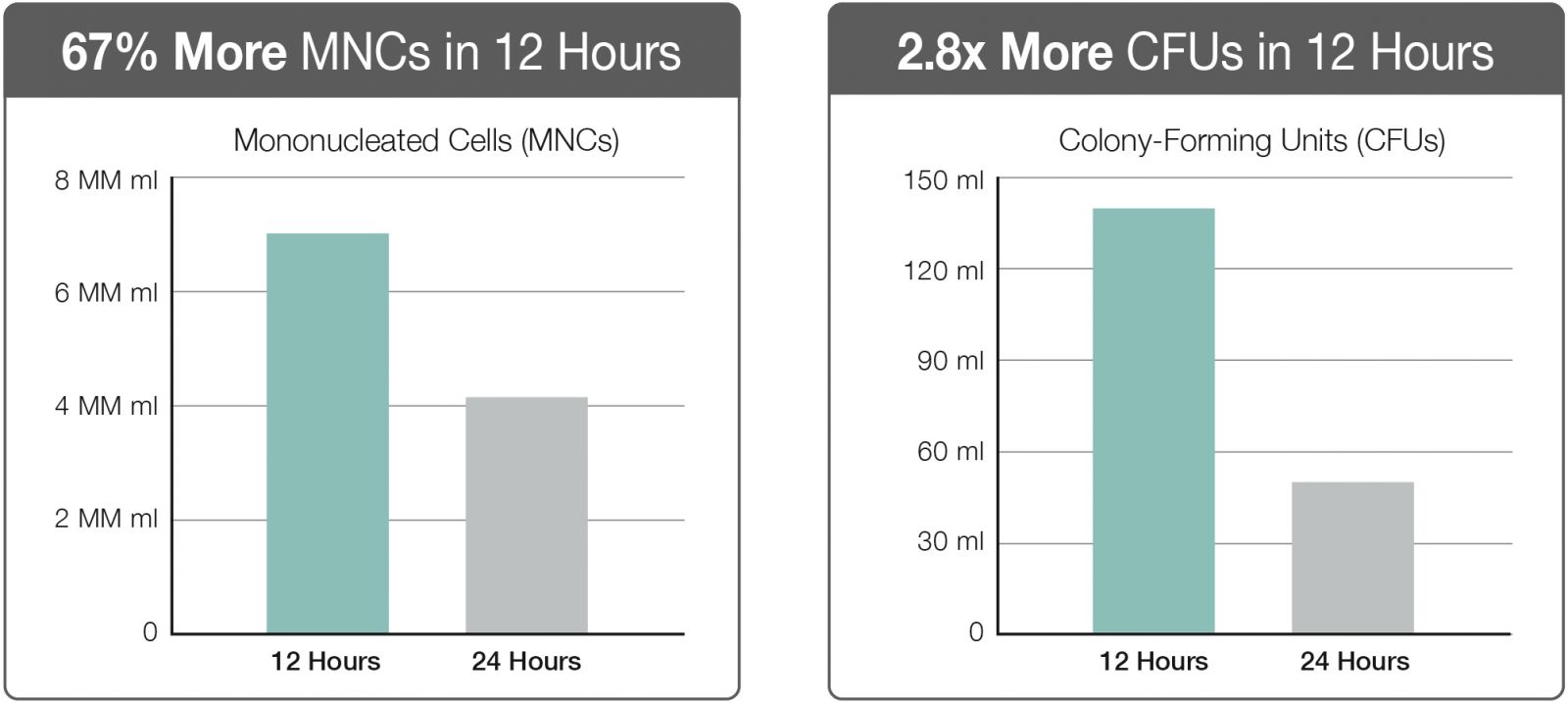 Testing....
Testing....
Time is the one factor having the greatest impact on the number of viable stem cells that can be saved for your family.
Stem cells from umbilical cord blood and cord tissue are living cells with a limited lifespan outside of the human body. Studies show that processing cord blood stem cells quickly after they are collected yields significantly more viable stem cells.1
The primary reason for banking your baby's cord blood and cord tissue stem cells is to ensure the best chance of a survival if you, your child, or a family member is ever faced with a critical disease or condition.
Having more viable cord blood stem cells available at the time of a transplant directly correlates to transplant success and patient survival rate.2 This is why it is critical to recover as many viable stem cells as possible, giving your family the best chance of a successful transplant outcome if a stem cell transplant is needed.
Processing cord blood quickly after collection, as shown in the charts below, yields significantly greater numbers of viable stem cells, and colony forming units that grow into life-saving tissue.1


We are dedicated to making sure your baby’s cord blood is processed quickly and efficiently — cord blood processing is TimeCritical.
MiracleCord’s TimeCritical cord blood processing provides the unique ability to transport your baby’s cord blood samples to our lab for processing in significantly less time than most other cord blood banks.
This increases the opportunity to recover the greatest number of viable stem cells from your baby’s cord blood and tissue.
Our direct medical courier service is specially trained in the handling of cord blood and human tissue. They are available 24 hours a day, 7 days a week (including holidays) to pick up and carefully transport the cord blood and umbilical cord tissue in a temperature-controlled environment.
With our TimeCritical processing, your baby’s specimens will always go on the next flight out directly to our laboratory and will be processed for long-term storage without delay.
MiracleCord’s TimeCritical processing, coupled with the thermal technology incorporated in our StemCare® cord blood collection kit, will give your family peace of mind knowing that your baby’s cord blood will be protected along every step of its journey to our lab.
All of this, combined with the use of the advanced automated processing at the laboratory, is designed to ensure that our processes will recover the greatest number of viable cells possible.
Most other companies report an average time of 24 hours or more from the time the cord blood is collected to the time it is processed at their lab. This means that cord blood specimens processed by other cord blood banks may experience a significant loss of both mononucleated cells (MNCs) and stem cell colony forming units (CFUs) that grow into life-saving tissue, when compared to MiracleCord’s exclusive TimeCritical processing.
Significant delays in processing can negatively impact the number of viable stem cells that can be recovered from the cord blood. In turn, this can have a detrimental effect on the outcome of what could have otherwise been a potentially life-saving transplant.
We understand that other cord blood banks that advertise the use of a “medical courier service” will use a medical courier to pick up your baby’s cord blood and cord tissue from the hospital, but what they don’t tell you is that typically one of two alternate shipping methods will be used after pick up:
The specimens will be dropped off at a nearby FedEx® or UPS® location. The transport to the lab is then handled by one of these conventional shipping carriers which could delay processing of your baby’s cord blood and cord tissue by 48 hours or more.
Also, conventional shipping carriers such as FedEx and UPS do not differentiate human tissue from their other package delivery services. They do not provide the specialized care or the temperature-controlled environment that is critical for the transport of biological materials.
The alternate shipping methods typically used by other cord blood banks are cost-cutting measures that ultimately add delay to the transport of your baby’s cord blood and cord tissue and can result in a significant loss of stem cell viability.
1 Shlebak AA, Marley SB, et al. Optimal timing for processing and cryopreservation of umbilical cord hematopoietic stem cells for clinical transplantation. Bone Marrow Transplantation 1999; 23: 131-136.
2 Wagner JE, Barker JN, DeFor TE, Baker KS, Blazar BR, Eide C, Goldman A, Kersey J, Krivit W, MacMillan ML, Orchard PJ, Peters C, Weisdorf DJ, Ramsay NKC, Davies SM. 2002. Transplantation of unrelated donor umbilical cord blood in 102 patients with malignant and nonmalignant diseases: Influence of CD34 cell dose and HLA disparity on treatment-related mortality and survival. Blood 100 (5): 1611-1618.
AXP is a registered trademark of ThermoGenesis Corp.; FedEx is a registered trademark of Federal Express Corporation; UPS is a registered trademark of United Parcel Service of America, Inc.